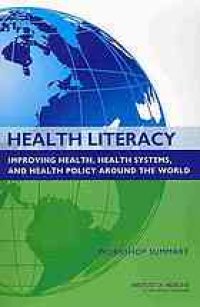"The roots of health literacy can be traced back to the national literacy movement in India under Gandhi and to aid groups working in Africa to promote education and health. The term health literacy was first used in 1974 and described as "health education meeting minimal standards for all school grade levels". From that first use the definition of health literacy evolved during the next 30 years with official definitions promulgated by government agencies and large programs. Despite differences among these definitions, they all hold in common the idea that health literacy involves the need for people to understand information that helps them maintain good health. Although the United States produces a majority of the research on health literacy, Europe has strong multinational programs as well as research efforts, and health literacy experts in developing countries have created successful programs implemented on a community level. Given these distinct strengths of efforts worldwide, there are many opportunities for collaboration. International collaboration can harness the United States' research power, Europe's multilingual and multinational experience, and developing nations' community-based programs to create robust programs and research that reach people--not based on language or nationality but on need and value. A workshop on international health literacy efforts that feature presentations and discussion about health literacy interventions from various countries as well as other topics related to international health literacy was held as the basis for this report. Health Literacy: Improving Health, Health Systems, and Health Policy Around the World summarizes the findings and discussions at the workshop"--Academy website. Read more...
